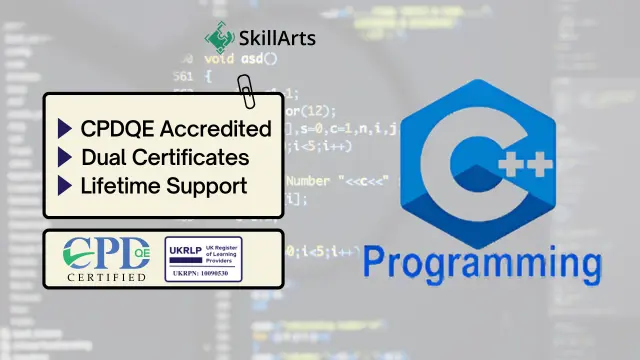
C++ from Scratch: Complete Coding Guide for Beginners - CPD Certified
C++ Operators | C++ Strings | C++ Control Flow Loops | C++ Decision Making | C++ Arrays | C++ Functions
Skill Arts
Summary
- Accredited Certificate on C++/Coding of Completion from SkillArts - Free
- Reed Courses Certificate of Completion - Free
- Tutor is available to students
Add to basket or enquire
Overview
Why Study This Diploma in C++ for Coding - CPD Certified Diploma?
- While specific UK data might be limited, a report by Indeed shows a global increase of 18% in C++ developer job postings year-on-year (YoY) (as of April 2024).
- A Glassdoor report suggests that the average base salary for C++ developers in the UK is £60,000 per year (as of April 2024).
Learning Outcomes:
- Learn to set up a local development environment for C++ coding.
- Master the different data types in C++ and their applications in coding.
- Learn to use loops effectively for repetitive tasks in your C++ code.
- Master the use of functions to create modular and reusable code in C++.
CPDQE Accreditation
This Diploma in C++ for Coding is CPDQE accredited. CPD is a globally recognised parameter for continuous professional development acknowledged by thousands of professional bodies, employers and academic institutions in the UK and around the world.
Dual Certificates
After completing this Diploma in C++ for Coding Course, you will receive a course completion certificate from Reed. Also, you will receive an Accredited Certificate of Completion From SkillArts.
Assessment Method:
- MCQ Based
- Pass Mark: 40%
- Assessment Fee: £5
Certificates
Accredited Certificate on C++/Coding of Completion from SkillArts
Digital certificate - Included
You must pass the final exam in order to obtain the SkillArts Certificate.
Reed Courses Certificate of Completion
Digital certificate - Included
Will be downloadable when all lectures have been completed.
Curriculum
Course media
Description
Diploma in C++ for Coding Course Syllabus
Introduction:
- Understand the basics and significance of C++ programming and coding.
- Learn about the history and applications of C++ in the coding world.
Setting up Local Development:
- Learn to set up a local development environment for C++ coding.
- Install and configure necessary tools and compilers for C++ coding.
C++ Basics:
- Understand basic C++ coding syntax and structure.
- Write simple C++ coding programs to familiarize yourself with the coding process.
C++ Data Types:
- Learn about various C++ data types such as int, float, char, and more for coding.
- Understand the usage and limitations of different data types in C++ coding.
C++ Operators:
- Master the use of arithmetic, logical, and relational operators in C++ coding.
- Learn to perform operations efficiently using C++ coding operators.
C++ Strings:
- Learn to declare, initialize, and manipulate strings in C++ coding.
- Perform common string operations such as concatenation, comparison, and searching in C++ coding.
C++ Decision Making:
- Understand the decision-making constructs in C++ coding such as if, else if, and switch statements.
- Learn to control the flow of your C++ coding programs using decision-making constructs.
C++ Control Flow and Loops:
- Master control flow mechanisms such as break and continue in C++ coding.
- Learn to implement loops (for, while, do-while) for repetitive tasks in your C++ coding programs.
C++ Arrays:
- Understand the concept of arrays and their usage in C++ coding.
- Learn to declare, initialize, and manipulate arrays for data storage in C++ coding.
C++ Functions:
- Gain proficiency in writing and using functions in C++ coding.
- Learn to create modular and reusable code using functions in C++ coding.
Who is this course for?
- Software Developer
- C++ Programmer
- Application Developer
This course will pave the way for higher study in the field of Coding. You can enrol on higher level Coding courses, such as:
- Level 1 Award in Introduction to Web Development with Coding
- Level 2 Certificate in Web Development with Coding
- Level 3 Certificate in Coding for Games Development
- Level 3 Diploma in Computer Science with Coding
Questions and answers
Currently there are no Q&As for this course. Be the first to ask a question.
Reviews
Legal information
This course is advertised on Reed.co.uk by the Course Provider, whose terms and conditions apply. Purchases are made directly from the Course Provider, and as such, content and materials are supplied by the Course Provider directly. Reed is acting as agent and not reseller in relation to this course. Reed's only responsibility is to facilitate your payment for the course. It is your responsibility to review and agree to the Course Provider's terms and conditions and satisfy yourself as to the suitability of the course you intend to purchase. Reed will not have any responsibility for the content of the course and/or associated materials.


